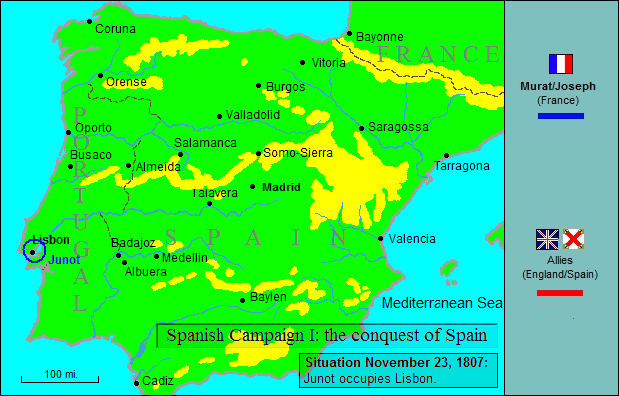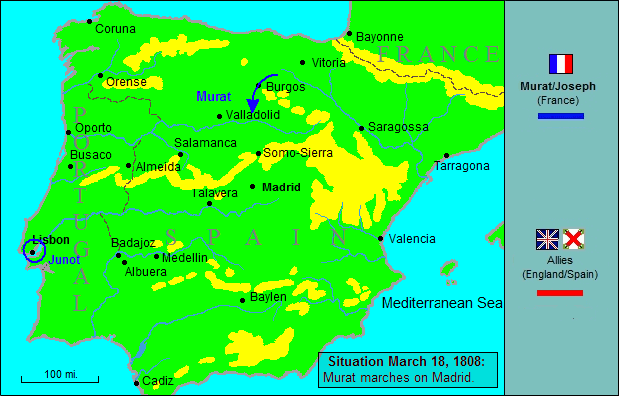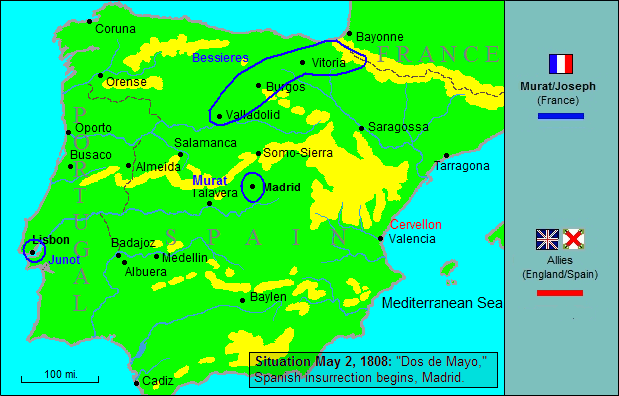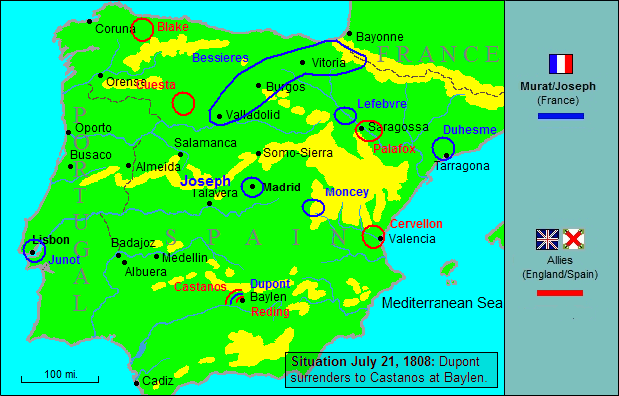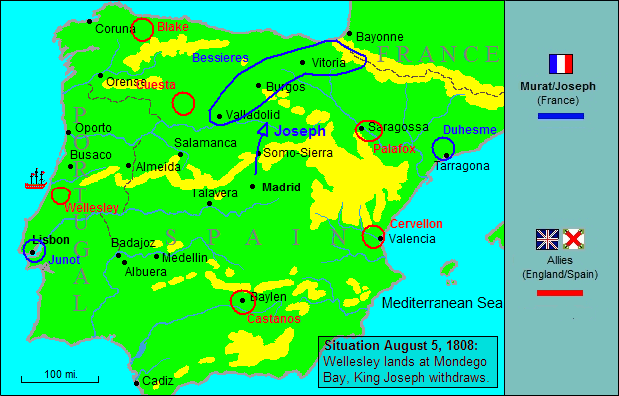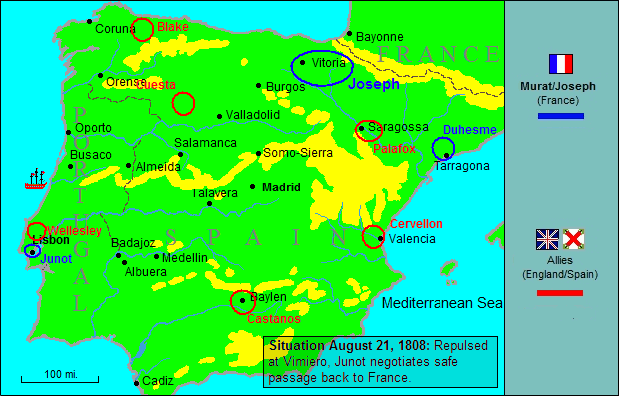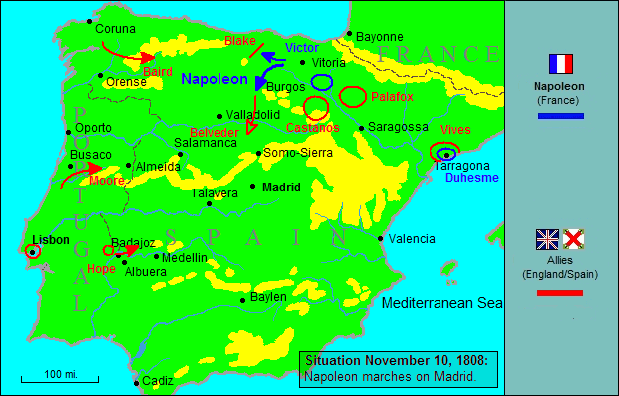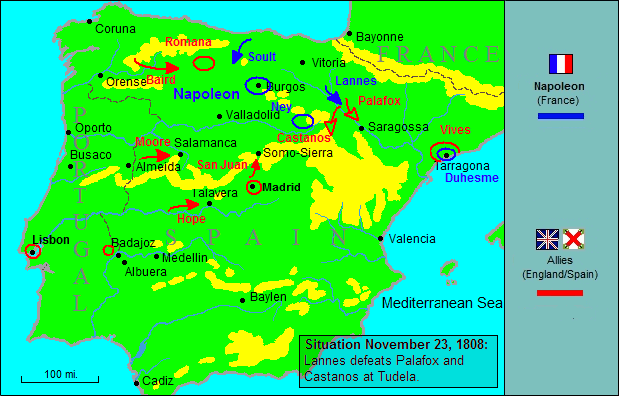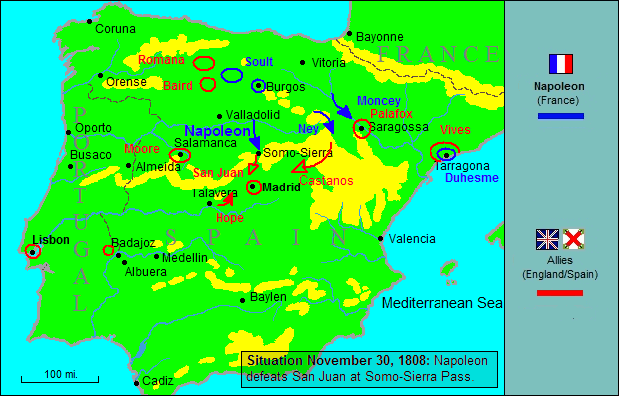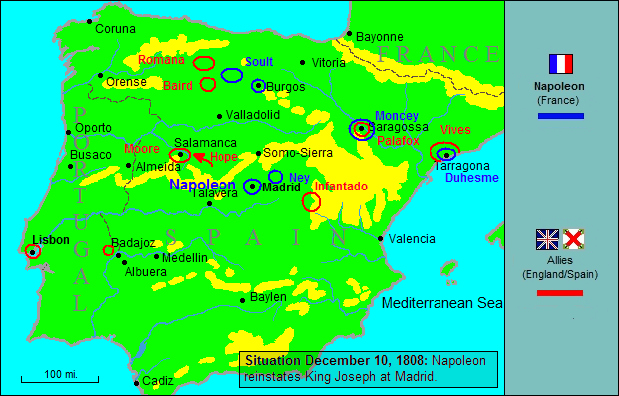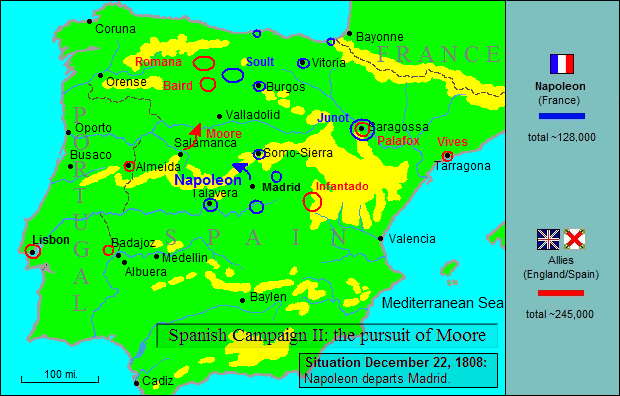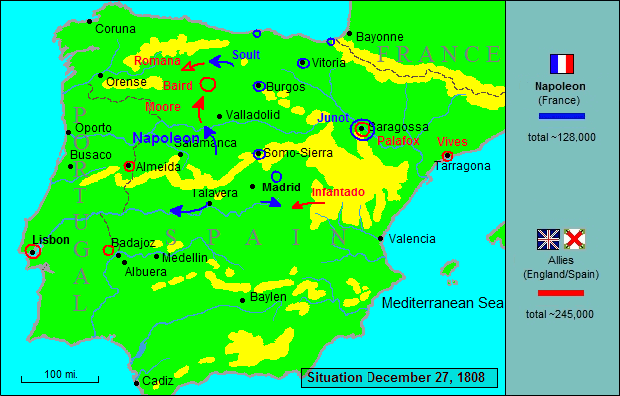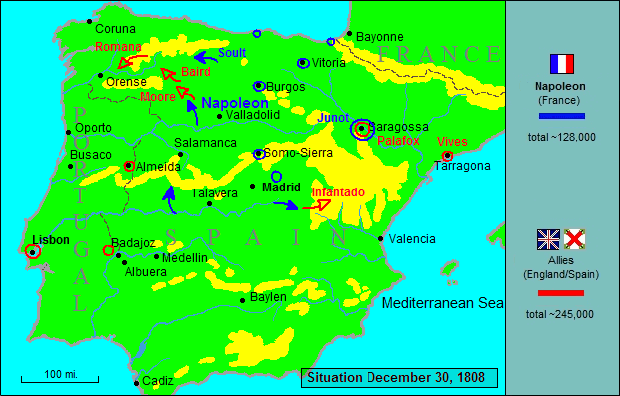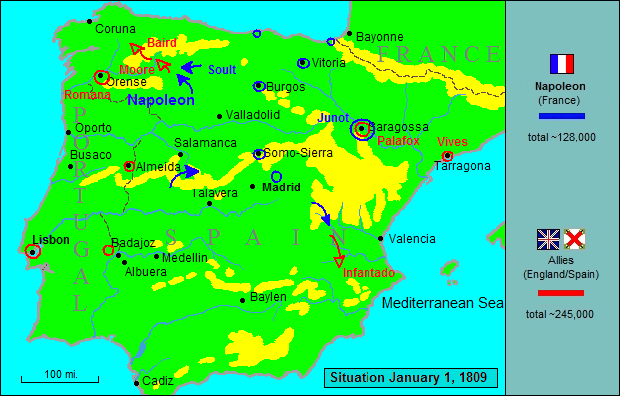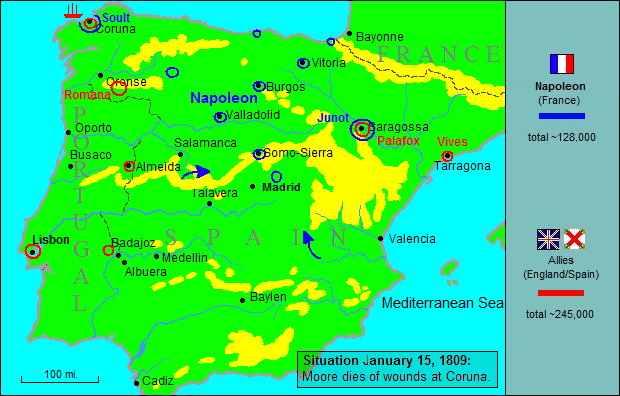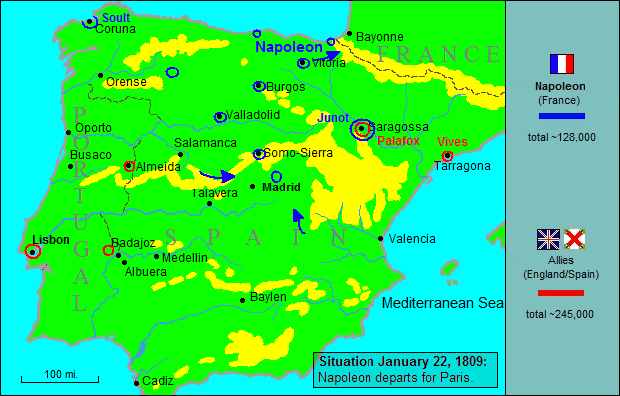Soldiers: I have need of you… Let us bear our triumphal eagles
to the pillars of Hercules.
–Napoleon
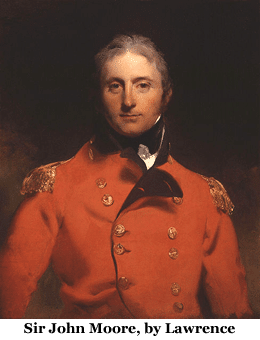
Driven by a long-standing hatred for the British and a particular fury over their seizure of the Danish fleet, Napoleon’s strategic thinking with respect to Spain would lack the deliberation of previous campaigns, suggesting judgments clouded by emotion and impatience. To begin with, his Spanish allies, enlisted to support the initial march on Lisbon, would quickly prove unreliable, failing to provide either troops or needed supplies, and leaving the French to negotiate unfamiliar country with faulty maps. To make matters worse, the expedition encountered heavy rains that sent rivers over their banks and washed out the country’s primitive roads, slowing their advance to a crawl. Having entered Spanish territory on 17 September, General Junot would take ten full weeks to reach Lisbon, and despite the absence of any organized resistance the journey would be remembered as a harrowing ordeal. Finally, its numbers much reduced by hunger and disease, the expedition limped into the Portuguese capital on the last day of November 1807, only to discover that two days previous–at the urging of the British–the Portuguese fleet and with it the country’s royal family had sailed for Brazil.
Once again thoroughly outfoxed by “perfidious Albion,” Napoleon vented his frustration on Spain, suddenly deciding to overthrow the country’s notoriously corrupt Bourbon king. Taken in the heat of the moment, the decision would prove uniquely ill-considered. Given the size and relative backwardness of the country and the challenges that would attend its occupation, there were no commensurate strategic reasons to interfere in Spanish affairs. For years Spain had been remarkably amenable to French ambitions, managing to countenance Napoleon’s sale of Louisiana to the United States in 1803–a sale made in clear violation of Spanish claims to the region–without a word of protest. Two years later Spain agreed to join the French naval operation that ended so disastrously off Trafalgar, and even the public outcry attending that terrible loss had not deterred the Spanish from involvement in the new alliance against Portugal. In the end, it seems Napoleon’s decision to take over the country was based on no better motive than his personal contempt for the passivity of the Spanish king, Charles IV.
Conceived in a fit of pique, the conquest of Spain would proceed by means of a series of deceptions. With Junot’s corps occupying Portugal, the French emperor insisted that additional French troops be based in Spain to support the expedition in the event of a British attack. At the same time, he encouraged the fatuous heir to the Spanish throne, Prince Ferdinand, to usurp his father, the king. Emboldened by hopes of French support for his cause, Ferdinand managed to get himself arrested for treason, and during the trial that followed Napoleon found occasion to send more French troops into the country for the ostensible purpose of maintaining order between the Prince’s supporters and those of the King. By the time the Spanish court realized what was happening, some 100,000 French soldiers had occupied Pamplona and Barcelona and were moving on Madrid. King Charles responded by attempting to flee the country for America but was captured by a mob of citizens outraged at his failure to resist the French invaders. At the insistence of the mob, Charles abdicated in favor of Ferdinand, who, with no more thought of resisting the French than his father had shown, meekly begged Napoleon to recognize his claim. In the end, Napoleon had both the King and Prince seized and taken to Bayonne, where he maneuvered them into renouncing the crown in favor of a king of his own choosing.
Meanwhile, back in Madrid, it remained for French troops under Joachim Murat, to hustle the king’s youngest son, thirteen-year-old Prince Francisco, out of the country lest he become the focus of ongoing unrest. But whereas the grown men of the family had submitted tamely to the takeover, the boy put up a struggle, refusing to leave the palace and defying his captors through a torrent of tears. Word of the child’s pitiful resistance quickly filtered out to the anxious crowds surrounding the palace, and in a blind fury, the assembled mob rose up against the soldiers assigned to escort the Prince to France. When the French fired upon their attackers, the entire population of the capital suddenly spilled into the streets. It was the second of May, 1808–Dos de Mayo–a date that would live forever in the consciousness of the Spanish nation. Armed with knives, clubs, and weapons of all kinds, the enraged citizenry fell upon and overwhelmed the French escort, and for several hours managed to reclaim their capital despite the presence of large numbers of French troops outside the city. Lacking any military organization, the resistance was as futile as it was brave, and by nightfall the French were back in force, putting down the rebellion in a series of brutal reprisals that only served to galvanize resistance throughout the country.
Moving quickly to suppress further rebellion, Napoleon stage-managed a transfer of power, “acquiescing” to a select deputation of Spanish legislators who petitioned him to place his brother, Joseph Bonaparte, on the Spanish throne, and on 15 June 1808, despite mounting evidence of a groundswell of popular resistance, Joseph was proclaimed king. For many Spaniards–mainly the upper classes and intellectuals–the new regime promised long-overdue reforms, yet the Spanish masses quickly revealed unprecedented solidarity in defense of their country’s honor. Incited to action by the Catholic clergy, the entire population, including regular Spanish troops previously disbanded during the initial French takeover, quickly undertook a guerilla war, employing hit-and-run tactics well suited to the rugged Iberian countryside. For all of their success in open-field operations, the French would make little headway against this style of warfare, which had not been seen in Europe since the Thirty Years War.
In response, Napoleon assembled five “flying columns” in bases stretching southwest from Bayonne and ordered them to converge on Toledo, roughly at the geographical center of the country. Their mission was to subdue the countryside in advance of King Joseph’s arrival in Madrid, a tall order under the best of circumstances, and after five years of fighting the War of the Third Coalition French were wearing thin. For one thing, many of the troops Napoleon sent to Spain were raw recruits drawn from various French satellite states, with little experience and less cohesion. And while the Spanish king had been weak and ineffectual, his subjects would prove otherwise. Proud and fiery by nature, the Spanish people were well-adapted to the rugged terrain and harsh conditions of the country and prepared to wage a relentlessly vengeful style of warfare that matched the enemy’s brutal methods, reprisal for reprisal. Finally, absent the inspirational presence of the Emperor, who would direct much of the campaign from Paris and beyond, the morale of the invading troops would suffer from the first.
The hazards of the campaign would be revealed soon enough, for apart from a single success in Galicia the four remaining French columns would all be turned back. At the point of the spear was a force of some 13,000 troops under General Dupont, who had been ordered to advance southward from the upper Tagus River, cross the Sierra Morena Mountains and proceed down the Guadalquivir River to Seville. They got as far as Cordoba, at which point their supply line was cut by a Spanish force under General Reding, prompting Dupont to return to Andujar. Having by this time been reinforced with an additional 10,000 men under General Vedel, Dupont succeeded in driving the Spaniards off but soon found himself surrounded when another Spanish army under Castanos appeared in his rear, barring the way through the mountains. Bogged down by a wagon train full of treasure seized along his route, Dupont ordered Vedel’s force to proceed ahead of the main body and secure the road through the mountains, at which point Castanos captured Bailen, thereby isolating Dupont’s weary force once more. Already suffering from a lack of supplies and now without food or water in the parching summer heat, Dupont made repeated attempts to break out the trap, while Vedel sought to rescue him from the north, but in the end, both commanders capitulated, surrendering a force of some 17,000 men. Of these, all but the officers were imprisoned in direct violation of the terms of surrender, and fewer than 3,000 would ever see France again.
The consequences of Dupont’s surrender would be far-reaching, for shortly thereafter, fearing for his own situation, King Joseph abandoned Madrid and withdrew east of the Ebro. This left Junot completely isolated in Portugal, where a British sea-borne expedition under Sir Arthur Wellesley, with a force of some 9,000 men, was about to land in Mondego Bay, to be joined by another 2,000 Portuguese troops for an advance upon Lisbon. Junot responded with only part of his force, leaving garrisons in various strongholds along his route, and as a result, was soundly repulsed at Vimiero. At this point, the French still held an advantage in numbers, but without hope of reinforcement or resupply, Junot suggested a deal, offering to abandon Portugal in exchange for his army’s passage back to France in English ships. To Wellesley’s dismay, Sir Hew Dalrymple, an English lord who had been sent to negotiate, promptly accepted the offer, declared victory and went home. In this case, the terms of surrender were honored, and shortly after returning to their homeland the French were on their way back to Spain; however, there was no disguising the fact that the French conquest of Spain was going badly awry.
By August of 1808, aware that his scheme to secure the Iberian peninsula was coming apart, Napoleon determined to take personal charge of the situation. Reorganizing the forces of the Grand Army on the empire’s eastern frontier, he began redirecting troops to the Spanish border, and on 3 November was himself in Bayonne to oversee operations. Setting out on the 9th, he advanced on Burgos, scattering a force of some 20,000 Spaniards and routing another at Espinosa. By the 14th French cavalry had advanced as far as Valladolid, and Marshal Lannes had broadened the French salient to the south and east, pressing a force twice the size of his own back upon Tudela and thence upon Saragossa. With the enemy falling back rapidly before him, Napoleon advanced upon Madrid along a route leading through a narrow pass in the mountains near Somo-Sierra. Here, a force of Spaniards under General San Juan contested the enemy’s passage from fortified positions on the surrounding hills, successive batteries of Spanish artillery pounding the advancing French columns from positions along the main road. In response to the galling fire of the enemy guns, a squadron of light cavalry–a Polish escort of the Guard, bespeaking the French army’s increasingly multi-national composition–charged uphill, taking out one battery after another and never stopping until they reached the summit, at which point San Juan’s entire force took flight. Several days later, on 3 December, its walls breached in two places, Madrid surrendered.
No sooner had Napoleon retaken Madrid, however, than he was compelled to return northward in pursuit of a British army under Sir John Moore. On the march from Salamanca to threaten the French rear, Moore hoped to link with another British army under Sir David Baird and seize Burgos, but word of the French pursuit quickly forced him to reconsider. Now both armies raced for the coast, struggling to cross the Cantabrian Mountains as winter weather brought heavy snows to the region. Eager to catch an English army in the field, Napoleon drove his troops relentlessly, but after a month of hard campaigning the men were rapidly approaching the limits of their endurance and at one point the Emperor was actually jeered at by his own troops as he made his way up a mountain pass amid a small group of officers. Already, it seemed, Spain had begun to tarnish his legend, and he was soon to learn of even more disturbing events in Paris, where the ministers of police (Fouché) and foreign affairs (Talleyrand)–both notorious intriguers–were plotting to undermine his rule. Worse still, Austria was once again preparing for war. Beset by these larger concerns, Napoleon turned over the pursuit of Moore to Marshal Soult, remaining in the country long enough to learn of the investment of Moore’s force at Coruna (Moore himself would be killed covering the embarkation of his men), before leaving Valladolid for Paris on 17 January 1809.
In the months to come, prolonged sieges at Saragossa and Gerona would cost the French many thousands of casualties, further inspiring the unprecedented resistance of virtually leaderless Spanish regulars and civilians. In addition, after a few months’ absence, the British would resume their advance from bases in Portugal, once more under the command of the gifted and aggressive Arthur Wellesley. Napoleon, however, would not return to Spain, and despite the presence of massive French armies, the country would remain in a state of continual insurrection.

